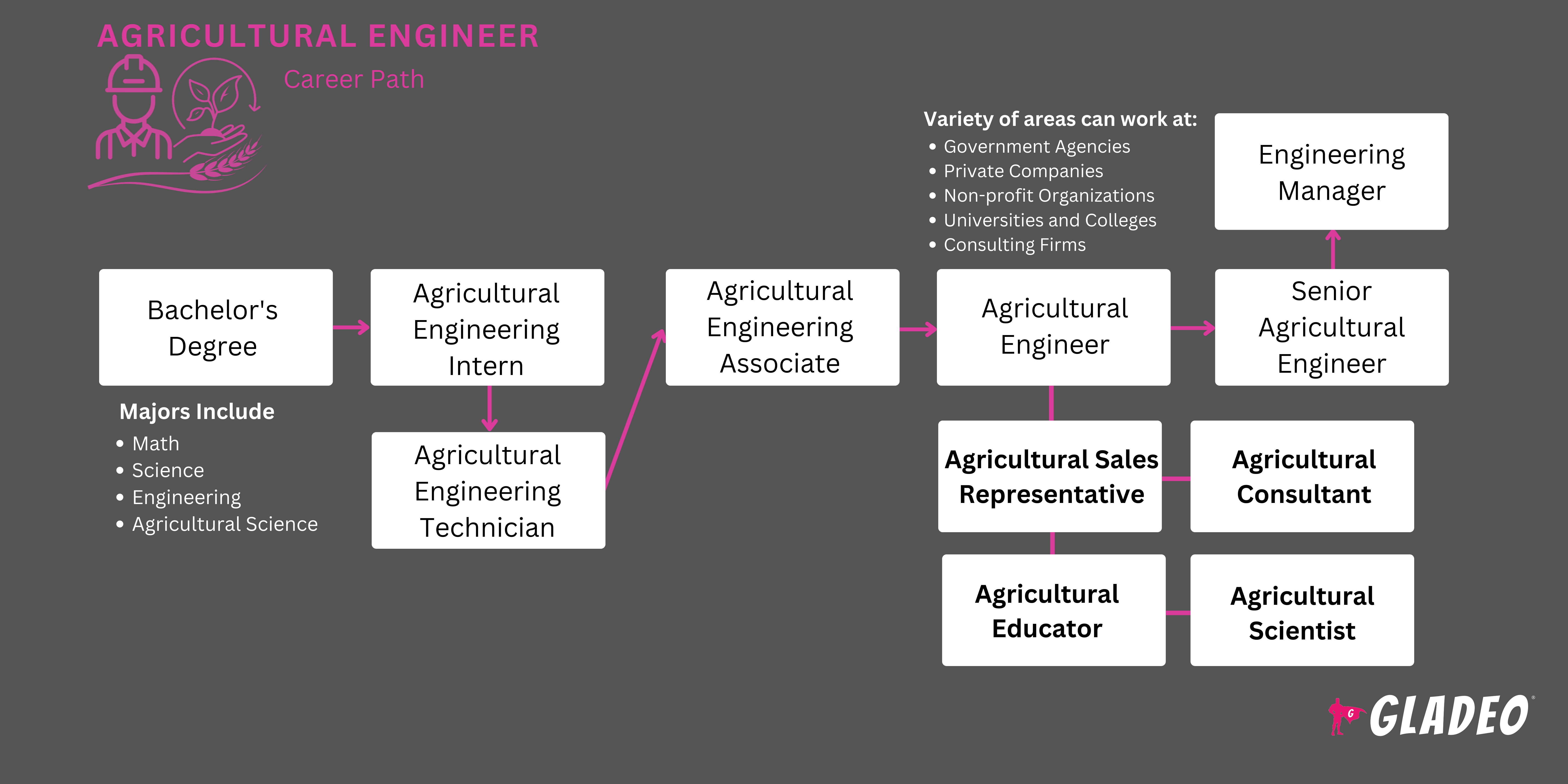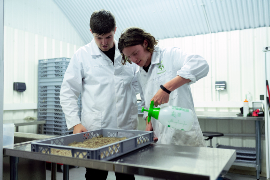聚光灯
农业系统专家、水土保持工程师、工程师、产品工程师、产品技术科学家、项目工程师、研究农业工程师
农业是一个万亿级产业,也是我国经济的重要支柱。其复杂程度远超多数人的认知——需要维护的机械设备、动力系统、灌溉设施及配套建筑不胜枚举,这正是农业工程师大展身手的领域。
农业工程师运用工程原理来提升流程、设备和系统的可持续性与生产力。这包括环境管理,以减少污染和对生态系统的有害影响。他们还协助将自动化和机器人技术融入农业经营,研究土壤肥力和养分含量,估算潜在作物产量,并优化食品加工方法。
简而言之,尽管他们从事的是相对狭窄的职业领域,但他们的洞见、知识、技能与服务对社会而言都具有无可估量的价值!
- 优化农业商业流程,使业主、消费者和环境共同受益
- 作为一个庞大行业的一部分,该行业对经济和食品供应链至关重要
- 在利润丰厚、专业化的利基领域工作,拥有广阔的职业发展前景
- 影响农村社区的财务健康与稳定
工作日程
- 农业工程师从事全职工作,通常享有夜间、周末及节假日休息。为满足工作期限,可能需要加班。偶尔需要出差,并可能面临恶劣天气的风险。
典型职责
- 与农民、水产养殖户、林业专业人士及食品加工团队在各类项目上开展合作
- 与雇主、客户、承包商、开发商、城市代表及同行工程师会面,共同审议项目内容、目标规划、时间安排及成本预算。
- 为项目创建提案、演示文稿、图表、预算和报告
- 使用计算机辅助设计软件设计农业设备、灌溉系统、气候控制系统、设施、传感器装置、布局、零部件等。
- 运用人工智能与地理空间系统来优化并自动化流程
- 设计方法以改变并最大化阳光、雨水和风对田地及建筑物的影响
- 协助创建更高效的气候控制和制冷系统、食品与农作物加工及储存设施、动物饲养场、土地复垦项目等。
- 为新建工程项目(如电力配电系统、灌溉系统或防洪系统)、新机械系统或生产工厂运营提供指导与监督。
- 就水质问题、污染管理及资源利用提供专业建议
额外职责
- 用于性能和安全测试的质量检测设备
- 进行实地考察并提供咨询
- 根据需要培训和指导团队成员
- 与当地农民、农业企业主、行业协会及相关组织或机构保持良好关系
- 为农民或农业合作社创建或提供教育材料,以增强可持续性
- 研究并开发新技术和潜在能力
- 及时掌握制造商手册、联邦及州法规、行业动态和技术进步的最新信息。
- 参加专业组织活动,分享信息并向他人学习
- 政府机构
- 教育机构
- 咨询服务与工程机构
农业工程师的工作对于帮助农业企业提高效率、实现可持续发展至关重要。国民经济——以及所有食品消费者——都高度依赖于这些企业的成功。
周边农村社区的发展状况也深受当地农场和农业企业经营状况的影响。与此同时,当地居民普遍对环境与食品安全问题高度关注。可以说,农业工程师肩负着重大责任!
农业工程师可能从小就对科学、自然、动植物或动手制作事物表现出浓厚兴趣。许多人成长于乡村地区,自幼接触农耕与园艺。还有些人纯粹热爱STEM相关活动,渴望将所学知识应用于改善周围世界!
- 农业工程师通常需要获得ABET认证的农业工程、农业、农业经营、生物工程或相关领域的学士学位。
- 许多学生选择攻读双学位(学士/硕士),这既能节省时间又能节约费用。
- 硕士学位或许并非必需,但它能提升你的竞争力,并可能让你获得更高的起薪或职位。
- 该领域的常见硕士学位包括农业理学硕士或工程硕士。
- 根据O*Net数据,该领域69%的从业者拥有学士学位,12%持有本科后证书,另有12%拥有硕士学位。
- 许多大学项目与当地企业合作,提供实习和合作教育机会,以培养学生的实践技能。
- 学生应深入理解农业领域及其影响因素。
- 常见的大学课程包括:
- 农业电子与控制
- 电力在农业工业中的应用
- 农用拖拉机与动力装置
- 食品加工工程技术
- 地理信息系统在资源管理中的应用
- 农业系统信息技术
- 农业系统管理
- 农产品加工与储藏
- 空间技术在精准农业中的应用
- 环境与自然资源工程技术
- 水土管理
- 可选认证包括:
- 美国质量协会认证可靠性工程师
- 美国农学会认证作物顾问与认证专业农艺师
- 美国农场经理与乡村评估师协会认证农业顾问
- 灌溉协会认证灌溉设计师 - 景观类
- 开始时无需执照,但职业生涯后期可考虑申请州级执业许可。
- 专业工程师(PE)执照可获得更广泛的责任范围
- 一名PE必须通过两门考试:
-工程基础考试(FE)——用于获得见习工程师(EIT)或实习工程师(EI)认证
-工程原理与实践考试(PE)
- 学生应选择开设农业或生物工程专业的大学。
- 寻找提供实习或其他实践机会的项目,以便积累实际经验,特别是与农业信贷管理相关的实践经验。
- 务必比较学费及其他费用的成本。仔细评估奖学金和助学金的选择方案。
- 看看这个项目是否与招聘毕业生的公司有合作关系!
- 请注意毕业生的毕业率和就业率统计数据
- 选修高中课程:生物学、化学、物理学、高等数学(代数、几何、三角学和微积分)、环境研究、计算机编程、制图、商业、工坊和写作。
- 向教师或辅导员咨询可参与的学校相关农业项目。
- 参与学校志愿活动,学习高效团队协作与项目管理能力
- 在大学期间寻找实习机会、合作项目或兼职工作
- 写下可作为工作推荐人的姓名及联系方式
- 研读与农业工程不同领域相关的书籍、论文及视频教程。思考你可能想专攻的领域!
- 尽早开始起草简历,并持续补充完善,以免遗漏重要内容。
- 考虑通过Coursera或其他平台选修短期课程,以深入了解农业商业领域。
- 申请与在职农业工程师进行一次信息性访谈
- 加入专业组织,学习知识、分享经验、结交朋友、拓展人脉(详见资源列表> 网站)

- 查看招聘网站,例如Indeed.com、LinkedIn、Glassdoor、Monster、CareerBuilder、SimplyHired或 ZipRecruiter。
- 另请查看AgCareers、AgHires、Farm Job Search、EcoFarm、Farm and Ranch Jobs、USDA Jobs及相关网站。
- 考虑搬迁至拥有农场和农业企业的乡村地区
- 让你的社交圈知道你正在求职。多数工作机会仍通过人脉关系获得——况且,这个领域本就不算庞大!
- 请询问您的导师、前任主管和/或同事是否愿意担任个人推荐人。未经事先许可,请勿透露他们的个人联系方式。
- 查看一些农业工程师简历范例及面试问题示例,例如“您曾采用哪些技术从土壤中提取有毒元素?”或“您如何与利益相关者沟通以改变他们对现有作物有机品种的看法?”
- 与学校的职业指导中心(如有)进行模拟面试练习
- 面试着装得体,展现你对该领域的热情与专业知识。
- 与领导层及利益相关方保持定期沟通,确保目标与时间框架清晰明确且切实可行。切勿做出无法兑现的承诺!
- 运用行业知识预判问题,在问题形成之前及时化解。
- 与其他农业企业中的同事交流,分享信息和经验(在可能的情况下。某些信息可能属于专有信息或其他受限信息)
- 为雇主解决棘手难题。通过提升效率、生产力和可持续性创造切实价值。
- 制定应急预案,以便对关键问题作出迅速而果断的响应。
- 研究适用技术、设备和工艺的发展趋势与最新进展
- 加入美国农业与生物工程师协会等专业组织。持续学习并拓展知识储备与技能体系。
- 与团队成员高效协作,并与当地农民、农业企业主及社区其他利益相关者建立牢固关系。
- 别害羞!和老板聊聊职业发展吧
- 考取专业认证,例如美国质量协会的认证可靠性工程师,或美国农学会的认证作物顾问和认证专业农艺师。
- 完成研究生学位,例如农业理学硕士或工程学硕士。
- 获取您的专业工程师执照
- 考虑申请加入一家规模更大的机构,那里有更多晋升机会。
网站
- ABET
- 美国地球物理联合会
- 美国工程教育学会
- 美国农业与生物工程师学会
- 美国农学会
- 美国土木工程师学会
- 美国灌溉顾问协会
- 国际农业与农村发展协会
- 美国未来农民协会
- 灌溉协会
- 农业工程学报
- 国家工程与测量考试委员会
- 国家工程技术认证研究所
- 美国农业部国家食品与农业研究所
- 美国国家专业工程师协会
- 美国食品药品监督管理局
书籍
- 农业工程与未来粮食保障作者:安妮·鲁尼
- 农业工程技术导论:问题解决方法论作者:哈里·L·菲尔德与约翰·M·朗
- 雨水收集用于灌溉:掌握花园或农场雨水收集的全部要诀作者:梅兰妮·戴维斯
农业工程是一个至关重要但规模相对较小的领域。美国劳工统计局当前的就业前景预测显示,未来几年该领域不会出现显著增长。这意味着,若想找到工作,你可能需要等待现任农业工程师退休!
若您对相关职业选择感兴趣,不妨考虑以下类似职业:
- 农业或食品科学家
- 建筑与工程经理
- 生物燃料生产经理
- 土木工程师
- 保护科学家
- 环境工程师
- 农场主/牧场主
- 水文学家
- 工业工程师
- 机械工程师
新闻源

精选职位

在线课程与工具

年薪预期
新员工起薪约为10.4万美元。年薪中位数为11.3万美元。经验丰富的员工年薪可达14.1万美元左右。
年薪预期
新员工起薪约为8.4万美元。年薪中位数为10.4万美元。经验丰富的员工年薪可达12.8万美元左右。
年薪预期
新员工起薪约为10.5万美元。年薪中位数为12.8万美元。经验丰富的员工年薪可达15万美元左右。
年薪预期
新员工起薪约为8.8万美元。年薪中位数为10.2万美元。经验丰富的员工年薪可达12.8万美元左右。







